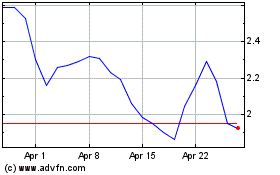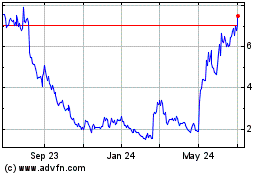By Thomas M. Burton and Sabrina Siddiqui
WASHINGTON -- The Food and Drug Administration is making
millions of Johnson & Johnson Covid-19 vaccine doses available
for export from a Baltimore factory that had been beset by
contamination problems.
A review determined that two batches of vaccines produced at the
Baltimore plant run by Emergent BioSolutions Inc. were suitable for
use, the FDA said Friday.
The agency also said that it wasn't yet ready to designate the
plant as an authorized manufacturing facility, and "continues to
work through issues there" with J&J and Emergent.
The two batches cleared for use will provide about 10 million
doses, according to people familiar with the situation. About 60
million doses were rejected for potential contamination, one of
these people said, confirming a report in the New York Times.
With those rejections, there are about 120 million vaccine doses
and unbottled substance made for J&J and AstraZeneca PLC at the
Baltimore plant that could be cleared in coming weeks and be
available for export, according to this person, a senior U.S.
official.
The J&J shots are one-dose vaccines that can immunize about
10 million people. AstraZeneca's are part of a two-shot regimen, so
those shots can immunize half as many people as doses
available.
The Emergent plant made vaccine for J&J and for AstraZeneca,
before an April 30 FDA inspection report concluded that the
facility didn't take proper measures to avoid cross-contamination
between the two companies' vaccine lines.
The release of the vaccines will help advance President Biden's
plan to export American-made vaccines to poor nations. In England
ahead of the Group of Seven summit Thursday, Mr. Biden announced a
plan to make 500 million doses of a third vaccine available to
other countries. That vaccine, from Pfizer Inc. and BioNTech SE,
also is given as a two-shot regimen.
Those donations are slated to take place over approximately the
next 12 months. The doses of Pfizer/BioNTech vaccine will be
provided through Covax, the global initiative to aid developing
countries in their struggle against the Covid-19 pandemic.
Mr. Biden had previously committed to export a total of 80
million doses by the end of June in a bid to increase global
vaccinations.
The White House said roughly 75% of those 80 million vaccine
doses will be shared through Covax. The remaining 25% will be
distributed to countries where cases are surging and to their
neighbors, as well as to partners who requested assistance from the
U.S. government.
The administration initially said 60 million doses would come
from AstraZeneca following an FDA review, since the vaccine had not
been authorized in the U.S., while the other 20 million doses would
be a combination of vaccines from Moderna Inc., Pfizer and Johnson
& Johnson, all of which are being administered
domestically.
Under the Biden plan, the biggest chunk of the first batch of
doses will go to South and Central American countries, including
Brazil, Argentina, Peru, Ecuador and Guatemala; countries in Asia,
including India, Nepal, Bangladesh, Pakistan and Sri Lanka; and to
Africa, with countries that will be selected in coordination with
the African Union.
Roughly six million doses will go to partners and regional
priorities such as Mexico, Canada, South Korea, the West Bank and
Gaza, and United Nations front-line workers.
White House press secretary Jen Psaki said earlier this week the
administration still planned to export all 80 million doses by the
end of the month.
"We remain committed to that. And obviously if the FDA approves
AstraZeneca doses, then that will be a component of that supply,"
she said.
Mr. Biden has said the U.S. will be a global leader in vaccine
diplomacy, which emerged as a top issue at the G-7 summit in
Cornwall, England. British Prime Minister Boris Johnson, who had
called on G-7 leaders to commit to vaccinating the rest of the
world by the end of 2022, said the U.K. will donate more than 100
million surplus doses globally in the next year.
Some of the world leaders in attendance have disagreed with Mr.
Biden's call to waive intellectual property rights for Covid-19
vaccines as a means of accelerating production in developing
countries.
The U.S. has also faced criticism from some lawmakers and
international aid groups for giving priority to the vaccinations of
Americans and being slow to share its supply globally.
Mr. Biden's move to export doses comes as U.S. demand for the
vaccine has waned following a mid-April peak of nearly 3.4 million
doses administered daily. The number of daily doses administered
over the past week averaged 1.1 million, according to the Centers
for Disease Control and Prevention.
--Peter Loftus contributed to this article.
Write to Thomas M. Burton at tom.burton@wsj.com and Sabrina
Siddiqui at Sabrina.Siddiqui@wsj.com
(END) Dow Jones Newswires
June 11, 2021 12:59 ET (16:59 GMT)
Copyright (c) 2021 Dow Jones & Company, Inc.
Emergent Biosolutions (NYSE:EBS)
Historical Stock Chart
From Mar 2024 to Apr 2024

Emergent Biosolutions (NYSE:EBS)
Historical Stock Chart
From Apr 2023 to Apr 2024
